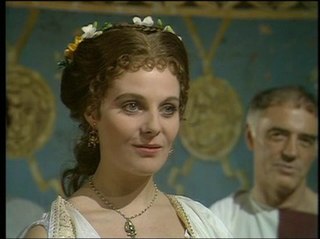Related Research Articles

Sir Patrick Stewart is an English actor whose career has spanned seven decades in theatre, film, television and video games. He has received accolades throughout his career including two Laurence Olivier Awards and a Grammy Award, as well as nominations for a Tony Award, three Golden Globe Awards, four Emmy Awards, and three Screen Actors Guild Awards. He received a star on the Hollywood Walk of Fame in 1996 and was knighted by Queen Elizabeth II for services to drama in 2010.

The Waltons is an American historical drama television series about a family in rural Virginia during the Great Depression and World War II. It was created by Earl Hamner Jr., based on his 1961 book Spencer's Mountain and the 1963 film of the same name. The series aired from 1972 to 1981.

Have I Got News for You (HIGNFY) is a British television panel show, produced by Hat Trick Productions for the BBC, which premiered on 28 September 1990. The programme focuses on two teams, one always captained by Ian Hislop and one by Paul Merton, each plus a guest panelist, answering questions on various news stories on the week prior to an episode's broadcast. However, the programme's format focuses more on the topical discussions on the subject of the news stories related to questions, and the satirical humour derived from these by the teams. This style of presentation had a profound impact on panel shows in British TV comedy, making it one of the genre's key standard-bearers.

Bernard Hill is an English actor. He is known for playing Théoden, King of Rohan, in The Lord of the Rings film trilogy, Captain Edward Smith in Titanic, and Luther Plunkitt, the Warden of San Quentin Prison in the Clint Eastwood film True Crime. Hill was also known for playing roles in television dramas, including Yosser Hughes, the troubled "hard man" whose life is falling apart in Alan Bleasdale's Boys from the Blackstuff in the 1980s, and more recently, as the Duke of Norfolk in the BBC adaptation of Hilary Mantel's Wolf Hall.

Sir John Vincent Hurt was an English actor whose career spanned over five decades. Hurt was regarded as one of Britain's finest actors. Director David Lynch described him as "simply the greatest actor in the world". He possessed what was described as the "most distinctive voice in Britain". He received numerous awards including the BAFTA Outstanding British Contribution to Cinema Award in 2012 and was knighted by Queen Elizabeth II in 2015 for his services to drama.

Sir Derek George Jacobi is an English actor. Jacobi is known for his work at the Royal National Theatre and for his film and television roles. He has received numerous accolades including a BAFTA Award, two Olivier Awards, two Primetime Emmy Awards, two Screen Actors Guild Awards, and a Tony Award. He was given a knighthood for his services to theatre by Queen Elizabeth II in 1994.

Louis Sebastian Theroux is a British-American documentarian, journalist, broadcaster, and author. He has received three British Academy Television Awards and a Royal Television Society Television Award.

Brian Blessed is an English actor known for his trademark bushy beard, booming voice, and exuberant personality and performances. He portrayed PC "Fancy" Smith in Z-Cars, Augustus in the 1976 BBC television production of I, Claudius, King Richard IV in the first series of Blackadder, Prince Vultan in Flash Gordon, Bustopher Jones and Old Deuteronomy in the 1981 original London production of Cats at the New London Theatre, Thomas Beaufort, Duke of Exeter in Henry V, Boss Nass in Star Wars: Episode I – The Phantom Menace and the voice of Clayton in Disney's Tarzan.

Bennet Evan Miller is an English comedian, actor and author. He rose to fame as one half of the comedy duo Armstrong and Miller. He is also known for his roles as DI Richard Poole in the BBC crime drama series Death in Paradise and James Lester in the ITV sci-fi series Primeval.

Toby Edward Heslewood Jones is an English actor. He is known for his extensive character actor roles on stage and screen. From 1989 to 1991, Jones trained at L'École Internationale de Théâtre Jacques Lecoq. He made his stage debut in 2001 in the comedy play The Play What I Wrote, which played in the West End and on Broadway, earning him a Laurence Olivier Award for Best Actor in a Supporting Role. In 2020, he was nominated for his second Olivier Award, for Best Actor for his performance in a revival of Anton Chekov's Uncle Vanya.

Sheila Susan White was an English film, television and stage actress.
John Michael Frederick Castle is an English actor. He is best known for his film and television work, most notably playing Bill in Michelangelo Antonioni's Blowup (1966) and Geoffrey in The Lion in Winter (1968). Other significant credits include Man of La Mancha (1972), I, Claudius (1976) and RoboCop 3 (1993).

Kevin Robert McNally, often credited as Kevin R. McNally, is an English actor and writer. He began his acting career in the BBC TV adaptation of I, Claudius (1976), but is best known for portraying Joshamee Gibbs in the Pirates of the Caribbean franchise.

I, Claudius is an unfinished 1937 film adaptation of the novels I, Claudius (1934) and Claudius the God (1935) by Robert Graves. Produced by Alexander Korda, the film was directed by Josef von Sternberg, with Charles Laughton in the title role. The production was dogged by adverse circumstances, culminating in a car accident involving co-star Merle Oberon that caused filming to be ended before completion. Footage from the production was incorporated into a 1965 documentary on the making of the film The Epic That Never Was.

I, Claudius is a 1976 BBC Television adaptation of Robert Graves' 1934 novel I, Claudius and its 1935 sequel Claudius the God. Written by Jack Pulman, it stars Derek Jacobi as Claudius, with Siân Phillips, Brian Blessed, George Baker, Margaret Tyzack, John Hurt, Patricia Quinn, Ian Ogilvy, Kevin McNally, Patrick Stewart and John Rhys-Davies. The series covers the history of the early Roman Empire, told from the perspective of the elderly Emperor Claudius who narrates the series.

Would I Lie to You? is a British comedy panel show aired on BBC One, made by Zeppotron for the BBC. It was first broadcast on 16 June 2007, starring David Mitchell and Lee Mack as team captains. The show was originally presented by Angus Deayton, and since 2009 has been hosted by Rob Brydon.

Death in Paradise is a British–French crime comedy drama television series created by Robert Thorogood, starring Ben Miller, Kris Marshall, Ardal O'Hanlon and Ralf Little.

Father Brown is a British period detective television series loosely based on the Father Brown short stories by G. K. Chesterton, starring Mark Williams as the crime-solving Roman Catholic priest. Broadcast began on BBC One on 14 January 2013. In April 2023 the BBC confirmed that filming had begun on an 11th series, for broadcast in January 2024, and also confirmed the return of Lorna Watson as Sister Boniface. The series will return for series 12.

Peter Kay's Car Share is a British sitcom set around supermarket assistant manager John Redmond and promotions rep Kayleigh Kitson, and their participation in a company car-sharing scheme.
References
- ↑ Brown, Les (6 November 1977). "TV's 'I, Claudius' Will Test the Boundaries Of Public Broadcasting". The New York Times. ISSN 0362-4331 . Retrieved 7 April 2022.
- ↑ "The Great I, Claudius Mystery | www.missing-episodes.com". missingepisodes.proboards.com. Retrieved 7 April 2022.
- ↑ "The Sunday Post: I, Claudius". BBC. 25 September 2016. Retrieved 7 April 2022.